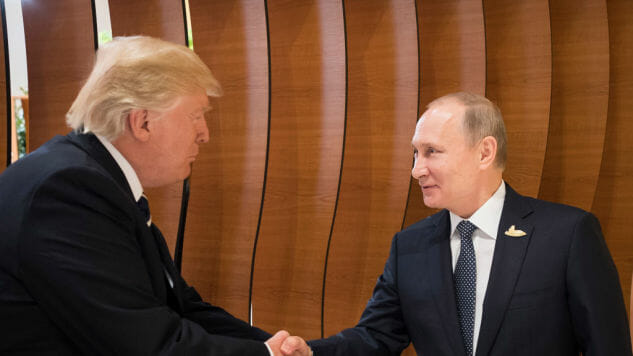The Trump-Putin Meeting Matters Less Than You Think
The episode of "Who's The Boss" nobody asked for
Steffen Kugler /BPA via Getty
Two powerful men sit in a room and make trouble for everybody else. It’s a situation that plays out a million times a day. Trump and Putin are merely a new verse of an ordinary song.
Being outwardly interesting and inwardly boring is a special kind of sin. Certain events create a perverse ratio between expected excitement and realized dullness. The Trump-Putin meetings is one such moment. “Wouldn’t you want to eavesdrop on that conversation?” In this case, no. If I wanted to hear a pair of wealthy guys complain about their problems, I’d eat dinner in Buckhead.
Two hours and fifteen minutes. That’s what it took for Trump and Putin to hash out the details. Longer than everyone thought, but too short to deal with everything. Most of their time was spent on Syria. But like the O.J. trial, the meat of the day was a single question: Did he do it?
Trump being Trump, he just shouted out the question. Right at the beginning of the meeting, The President raised the issue of the involvement. Had the Kremlin put its hand to the wheel?
The Orangeman had been skeptical of it before—at least in public. But this is Trump, who is a windmill for the cable news. The weathervane of the moment turned, and he went with it. The rest of the G-20 world go on to talk of cabbages and kings: the problems of North Korea, Ukraine, and climate change. Outside, the German Polizei were practicing politics with water cannons. But for the moment, in a chamber in Lower Saxony, the Russian autocrat and the American blowhard did the business. The results were as underwhelming as expected.
Of course Trump brought up the issue. Who could have stopped him? When has he ever been able to control his impulses? Who knows what that brought it to the front of his mind? Perhaps an adviser whispered in his ear. Perhaps FOX raised the issue. The Internet may have thrown in. Who can fathom the resentful, burger-eating mind of Brand Trump?
He asked Putin. Putin said there had been no interference, and asked for evidence. Evidence. Putin, I take it, is not a Twitter user.
More to the point, why did Trump feel the need to ask?
I suspect Trump adheres to the Dramatic Confrontation school of political thought. Most Americans do. The theory of Dramatic Confrontation goes like this: the powerful just need to be asked the right questions. If you ask Putin the right query, the perfect interrogative phrase, he will be forced to give you a true answer.
Because that’s the way it happens in movies. Eventually, the mighty are asked an armor-piercing puzzler. They gape. They verbally fumble. They search around for an answer. They seem foolish, and everyone else is made aware of their folly, and by extension their emotional discomfort at being called to task. When conservatives write fan fiction about being face-to-face with Hillary or Obama or any other bogeyman of the conservative world, it doesn’t take the author too long to get the upper hand. In these narratives, the protagonist usually has to ask one question, and the politician falls apart. Sorkin is full of such moments.
A significant part of Trump’s appeal came from the illusion that here, at last, was a man who would use the word “radical Islam” in speeches. He would say the Forbidden Words You Were Not Allowed to Say. Speaking dopey, offensive terms is the conservative version of liberal performance magic. Trump using the term “The West” is the right’s version of the Fearless Girl statue … and just as unlikely to achieve anything of note or value. But the story remains the same: if you ask the right question in the right meeting then the wheels will finally start moving. Alex Jones has built an entire shirtless career on this idea.
-

-

-

-

-

-

-

-

-

-

-

-

-

-

-

-

-

-

-

-

-

-

-

-

-

-

-

-

-

-

-

-

-

-

-

-

-

-

-

-








































